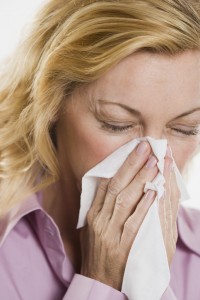 The weather is warming up nicely, and spring around the Bay Area usually means that seasonal allergies are starting to kick in. Pollen, mold or pet dander can all trigger allergies; with the latter two we can usually control our exposure. When it comes to pollen, controlling exposure to it while you are outdoors during this season is not possible. When an allergen enters our nasal passages it triggers an immune reaction that causes the release of histamine along with other chemicals. The histamine triggers a reaction in our body to help us in getting rid of the pollen or other irritant. The typical reaction includes sneezing, itchy eyes, scratchy throat, watery discharge from the eyes. Asthma sufferers often notice an aggravation in their asthma symptoms if they suffer from seasonal allergies.
The weather is warming up nicely, and spring around the Bay Area usually means that seasonal allergies are starting to kick in. Pollen, mold or pet dander can all trigger allergies; with the latter two we can usually control our exposure. When it comes to pollen, controlling exposure to it while you are outdoors during this season is not possible. When an allergen enters our nasal passages it triggers an immune reaction that causes the release of histamine along with other chemicals. The histamine triggers a reaction in our body to help us in getting rid of the pollen or other irritant. The typical reaction includes sneezing, itchy eyes, scratchy throat, watery discharge from the eyes. Asthma sufferers often notice an aggravation in their asthma symptoms if they suffer from seasonal allergies.
What can you do naturally to quell this response? Most natural treatments to seasonal allergies have to be taken daily and preventatively. Some lifestyle changes can help with mild seasonal allergies. Keep windows closed, whether at home or in a car. Limiting your time outdoors when pollen counts are high – go to this website to find out your local pollen count forecast.
Nasal Lavage – using a neti pot or nasal lavage bottle (Nasopure) can help rinse away allergens that may be irritating your nasal passage. The saltwater flush helps keep sinuses clear of pollen and other sinus congestion. Using a nasal lavage twice a day during allergy season is an inexpensive and effective way of treating seasonal allergies.
Allergy symptoms are responsive to high doses of Vitamin C. Vitamin C has anti-inflammatory and anti-histaminic properties that make it go-to for allergy treatment. Whether it is a runny nose or sinus congestion, Vitamin C can help reduce the severity of these symptoms.
Studies done in Germany have shown that patients whose diets’ were rich in omega-3 fatty acids experienced reduced inflammation and decreased allergy symptoms. Omega-3s are found in cold-water fish, walnuts, flaxseed oil, grass fed meat and eggs. Here is a list of healthy fish.
Quercitin – a natural antioxidant found in citrus fruits, sage, onions, apples, parsley, tea, tomatoes and lettuce. Quercitin is an antioxidant and it also acts like an antihistamine and anti-inflammatory. It helps stabilize the immune cells that release histamine in the body. Based on this effect, quercitin has shown to be helpful in preventing and reducing the symptoms of allergies and hay fever.
Stinging Nettle (Uritca diocia) is a great option for people who want a natural antihistamine. Nettles, much like quercitin, inhibits the body’s ability to produce histamine. Tinctures or capsules (freeze dried leaves) of this herb are the most effective form. Best taken daily, Nettles is a favorite natural remedy for allergies for many herbalists.
Sublingual Immunotherapy (SLIT) is a treatment that has been used for over 20 years and is a great alternative to allergy shots. SLIT requires patients to put drops of the allergen(s) in minute doses under their tongue. This daily treatment used over several years helps lessen the body’s response to food and environmental allergens. A recent study from England found that patients who used SLIT for two years had significant improvement in their allergy related symptoms in comparison to patients who had received a placebo.
About the Author
Written by Dr. Mundeir
Dr. Jaspreet Mundeir, ND is a licensed Naturopathic Doctor practicing in the East Bay Area. She is the owner of East Bay Natural Medicine where she focuses on helping patients achieve their optimal health state using homeopathy, hydrotherapy, nutritional supplements, botanical medicine and bio-identical hormones.
Famous Posts
-
Immune Booster Injections
Are you looking for an effective way to boost your...
-
Wet Socks Treatment
You’d probably never guess that a pair of wet socks...
-
Dandelion Salad Recipe with Fresh Goat Cheese & Apples
Dandelion greens pack a nutritional punch. Serve them...
-
2015 Dirty Dozen
The Environmental Working Group has put out their latest...
-
March 2013 – Chronic Fatigue
By now most of my current patients have been to the...
Categories
- Blog (116)
- Events (6)
- Newsletter (38)
Recent Posts
- 20Nov
Natural Ways to Prevent and Treat Colds & Flu
BlogWhen it comes to cold and flu season, prevention really...
- 15Mar
Shopper’s Guide to Pesticides in Produce – 2023
BlogThe Environmental Working Group does invaluable work...
- 06Aug










